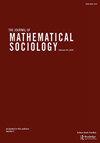舆论形成中的逆向效应——从格蕾塔·桑伯格现象看
IF 0.7
4区 社会学
Q3 MATHEMATICS, INTERDISCIPLINARY APPLICATIONS
引用次数: 7
摘要
近几个月来,格蕾塔·桑伯格的形象和气候变化的主题迅速成为争论的焦点。这导致了关于气候问题的意见形成的两极分化效应。从分析这一现象开始,我们建立了一个意见动力学模型,其中考虑了几种类型的逆向代理。每个代理应该对彼此相关的几个主题有自己的看法;因此,在这些话题上形成的观点也是相互依赖的。本文的目的是研究逆向代理人对这些话题的集体意见的间接影响。为了突出模型的主要特征,给出了几个数值试验。本文章由计算机程序翻译,如有差异,请以英文原文为准。
Contrarian effect in opinion forming: Insights from Greta Thunberg phenomenon
ABSTRACT In recent months, the figure of Greta Thunberg and the theme of climate changings quickly became the focus of the debate. This has led to a polarization effect in opinion forming about the climate subject. Starting from the analysis of this phenomenon, we develop an opinion dynamics model in which several types of contrarian agents are considered. Each agent is supposed to have an opinion on several topics related to each other; thus, the opinions being formed on these topics are also mutually dependent. The aim of the paper is to investigate the indirect effects of contrarian agents on the collective opinion about these topics. Several numerical tests are presented in order to highlight the main features of the model.
求助全文
通过发布文献求助,成功后即可免费获取论文全文。
去求助
来源期刊

Journal of Mathematical Sociology
数学-数学跨学科应用
CiteScore
2.90
自引率
10.00%
发文量
5
审稿时长
>12 weeks
期刊介绍:
The goal of the Journal of Mathematical Sociology is to publish models and mathematical techniques that would likely be useful to professional sociologists. The Journal also welcomes papers of mutual interest to social scientists and other social and behavioral scientists, as well as papers by non-social scientists that may encourage fruitful connections between sociology and other disciplines. Reviews of new or developing areas of mathematics and mathematical modeling that may have significant applications in sociology will also be considered.
The Journal of Mathematical Sociology is published in association with the International Network for Social Network Analysis, the Japanese Association for Mathematical Sociology, the Mathematical Sociology Section of the American Sociological Association, and the Methodology Section of the American Sociological Association.
 求助内容:
求助内容: 应助结果提醒方式:
应助结果提醒方式:


